Posts Tagged ‘PEN International Writers in Prison Committee’
PEN Journey 23: Nepal—WIPC Crossing the Bridge Between People
PEN International celebrates its Centenary in 2021. I’ve been active in PEN for more than 30 years in various positions and now as an International Vice President Emeritus. With memories stirring and file drawers of documents and correspondence bulging, I am a bit of a walking archive and have been asked by PEN International to write down memories. I hope this personal PEN journey will be of interest.
As I write these PEN Journeys, memory differs with each one. I sit and think, pulling up whatever memories I have. Some are visual; some are of activities, some of the twists and turns in PEN itself; many are of friends, a few of incidents; others come from concurrent parts of my life such as moving to London with my family and connecting to work at International PEN headquarters (PEN Journey 5), or scaling the Berlin Wall just after Germany reunited (PEN Journey 4), or visiting Russia shortly after the coup attempt (PEN Journey 8).
I have paper documentation for most of PEN’s events, not because I was an archivist in the making but more of a packrat who was too busy to sort through papers after a congress or conference and so set the files in a drawer. I am not even accounting for all the emails and digital files that began to accumulate in the late 1990’s and 2000’s. In my recounting, I am only now entering that period when the internet and email were burgeoning. For some of the Journeys I have photographs, but my picture-taking was random in retrospect, probably reflecting my role at the time. The more work I had, the fewer pictures. There were no iPhones or Android phones during these earlier years so I had to have a camera at hand. In certain years I have no photographic record of PEN though some may yet turn up in the recesses of my basement. There are, however, always pictures in my head.
For the Writers in Prison Committee’s (WiPC) third biannual meeting in Katmandu, Nepal in the spring of 2000, I have lots of pictures. We were celebrating the 40th anniversary of International PEN’s Writers in Prison Committee. As ex-chair, I helped with the conference, but the burden of the meeting wasn’t mine so I was also out with camera in hand. In my head I still carry the landscape of Nepal—the hills outside Katmandu with the haze over mountains in the distance, the woman in a red sari walking up the hill carrying bundles of sticks, the gentle landscape and the harsh conditions.

Landscape in hills and fields outside Katmandu, Nepal at Writers in Prison Committee Conference, April 2000
I arrived a few days early to visit schools and women’s education projects relating to other work I did, some as a board member of Save the Children. By the time I joined the PEN Conference, I had already fallen in a soft love with the country and its people, the old—sometimes centuries old—and the new culture: Katmandu with its rickshaws and bustling streets and vibrant colors and the hills outside where farmers still farmed with oxen plowing the fields and children high in the hills crowded into village schools and women learning to read in makeshift community libraries. And there was the nation’s complicated governing system with a privileged royal family which only a year later would be massacred by one of its own and in the hills a Maoist insurgency developing which threatened the government and population for years to come. Nepal was as dramatic a place as the landscape it occupied.

At work and rest at WiPC Conference. L to R: Alexander (Sascha) Tkachenko (Russian PEN), Joanne Leedom-Ackerman (American PEN/PEN Int’l), Mitsakazu Shiboah (Japan PEN), Jens Lohman (Danish PEN), Cathy McCann (Asia researcher PEN Int’l), Larry Siems (American PEN), Eugene Schoulgin (Norweigan PEN), Lucina Kathman (San Miguel Allende PEN)
At PEN’s WiPC conference, 43 writers gathered from 25 countries representing every continent except Africa where the costs had limited attendance. Before the meeting WiPC chair Moris Farhi and I and the WiPC staff met to identify areas of work that needed review and possible restructuring. From a survey of the centers we developed discussion points which were circulated before the meeting. Since the fall of the communist states, PEN had seen a growth in membership, an increase in freedom of expression work by the centers, and an expanded use of email and the internet. The innovation in communications was having an impact on the way PEN did its work and challenged old methodologies such as letter-writing campaigns.
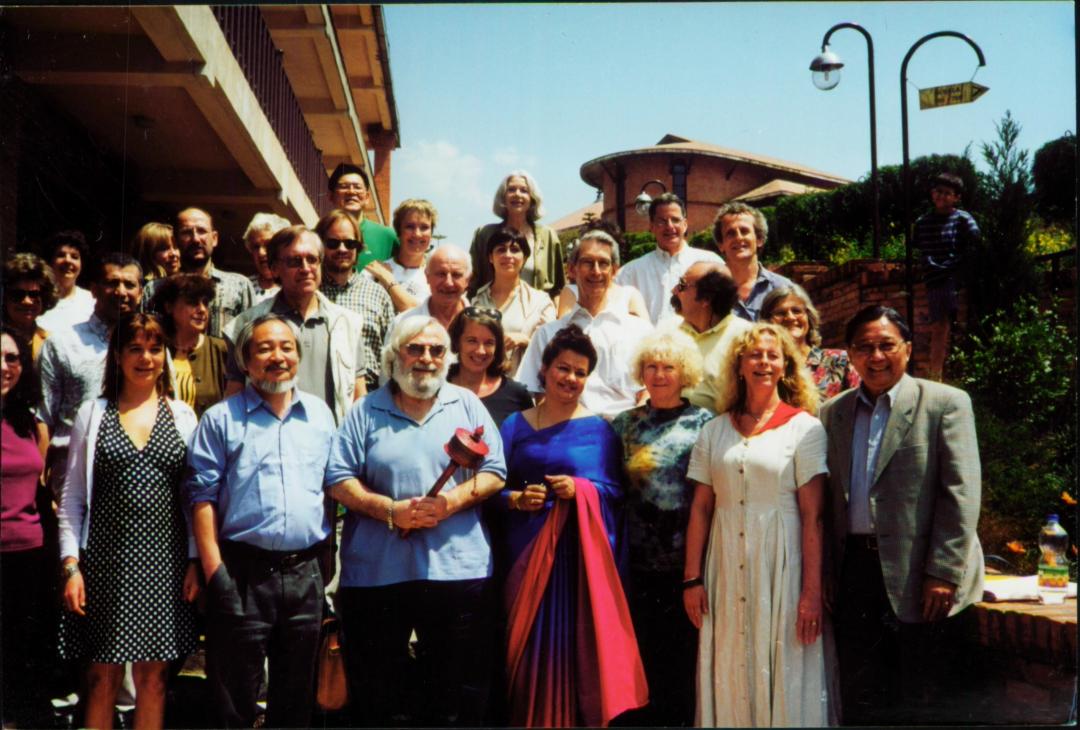
Delegates at PEN Writers in Prison Committee Conference, Nepal, 2000. In center WiPC Chair Moris Farhi holding local prayer wheel.
The agenda developed included workshops on the use of the internet, on PEN’s WiPC case list and newsletter, on PEN’s commitment to journalists in peril as compared to writers who had no other organization to protect them. We considered crisis situations and the changing nature of repression, including nongovernment and non-custodial forms of repression, WiPC relations with international organizations, the role of PEN’s Congress, the role of regional centers and networks, the value of PEN missions to other countries, and always, the discussion on how to fund the work and how to assure those finances included funds to bring delegates from every region to future meetings.
Looking back at the program, it appears exhaustive (or exhausting), though I don’t recall it as tedious or overwhelming. With each workshop, the group developed a summary of the situation and recommendations. For example, a recommendation was to post on PEN’s website, accessible to everyone, the information on the RAN special actions. The RAN (Rapid Action Network) itself was a relatively new tool which was sent out over the internet for immediate action on certain PEN cases. It was also agreed and recommended in another workshop that journalists should continue to be part of PEN’s campaigns and that PEN should collaborate more closely with journalists’ organizations.
Reading through the minutes and recommendations of the four-day meeting, I am impressed by the professionalism of the work of the WiPC staff, small as it was, just Sara Whyatt, Program Director and Cathy McCann, Asia researcher.
At the Nepal conference a new WiPC chair—Eugene Schoulgin from Swedish PEN was elected to take over from Moris Farhi after PEN’s Congress in Moscow the following month.
As well as workshops and discussions, we were entertained by local groups and also entertained ourselves with song and dance in the evening as we had at the first WiPC conference in Helsingør (PEN Journey 17).

After working days at WiPC Conference, music and dancing, including local Nepal PEN members and Sara Whyatt (WiPC Program Director) in orange skirt on left and on right Archana Singh Karki (Nepal PEN) in white; local musicians in middle.
On the last day UNESCO sponsored a panel The Culture of Peace: Censorship and the Writer which PEN Nepal President Greta Rana introduced, observing that censorship led to violence and that 47 journalists in South Asia were currently imprisoned for addressing free expression issues. Sara Whyatt in her introduction of the printed talks noted that free expression was inextricably entwined with the promotion of peace for without voices to challenge dictatorships and warmongers, peace would be an even rarer commodity than it was.
Because I don’t need copyright permission to reprint my talk, I take the liberty of sharing it below. Other panelists included Ratna Sarumpaet, an Indonesian script writer whose play about the plight of women laborers led to her imprisonment; Kunda Dixit, a Nepali journalist who spoke about the role of the free media in ensuring objectivity in times of pressure from political and corporate interests; Shahid Nadeem, a Pakistani playwright long exiled in England, who told of returning to Pakistan where critical voices were still seen as a threat; WiPC Chair Moris Farhi who noted that xenophobia and religious fanaticism were increasingly dangerous elements; Rajeev Rajbhandari, a Nepali internet expert, who argued it was not the content of the internet that was problematic but the uses of its new technology; Romesh Gumesekere, a Sri Lankan author and poet, who identified illiteracy as an encumbrance to the promotion of free expression; and myself whose talk below began with the poem of the renowned Turkish poet Nâzım Hikmet:
The prisoner Halil
closed his book.
He breathed on his glasses, wiped them clean,
gazed out at the orchards,
and said:
“I don’t know if you are like me,
Suleyman,
But coming down the Bosporus on the ferry, say
making the turn at Kandilli,
and suddenly seeing Istanbul there,
or one of those sparkling nights
of Kalamish Bay
filled with stars and the rustle of water,
or the boundless daylight
in the fields outside Topkapi
or a woman’s sweet face glimpsed on a streetcar,
or even the yellow geranium I grew in a tin can
in the Sivas prison—
I mean, whenever I meet
with natural beauty,
I know once again
human life today
must be changed . . .”
—Nâzım Hikmet, Human Landscapes
In 1938 Turkish poet Nâzım Hikmet (1902–63) was sent to prison, charged with “inciting the army to revolt,” convicted on the sole evidence that military cadets were reading his poems. He was sentenced to 28 years but was released 12 years later in 1950. His “novel” in verse, Human Landscapes from My Country, was written in prison, featuring Halil, a political prisoner, scholar, and poet who was going blind….
Today in Istanbul journalist Nadire Mater is charged with “insulting the army” for her book Mehmet’s Book, a collection of interviews with soldiers who have served in the conflict with the Kurds in the Southeast of Turkey. Nadire Mater and her publisher will be in court in early May to face charges, which could bring them at least six years in prison.
I’d like to read a brief passage from one of the interviews in Mehmet’s Book:
These friends coming from the West didn’t really know any Kurds, because they don’t know any they couldn’t really understand very well. What should be said about this? They are not familiar, and not being familiar, they act according to the government’s opinion…They’ve adapted to what they hear and read. I would explain to these friends that the other side is human, that the politics of the government is wrong.
We all of course adapt to what we hear and read. That is why it is so important that we have the opportunity to consider many points of view. The reality we carry in our heads and in our hearts shapes us as individuals and governs us as nations. Writers are the ones who produce what people read. The writer bears both the responsibility and the liability for his words and the realities they evoke. The writer can be a positive instrument for change as Hikmet saw the need, or as we have seen in the past decade in the Balkans, the writer can inflame animosities. The writer is not always the hero, but at his or her best, the writer can build bridges, reporting on and imagining not only himself, but those who are not him, illumining he humanity that connects us.
Peace between people relies on such bridges. The nature of a bridge is to span the space between points. The pilings of a bridge absorb the tension as one crosses over the space. However, censorship undermines, even destroys the pilings. The censor would allow only a limited view of reality, and by disallowing other views, the censor cuts away at the pilings necessary to build the bridge between him and the so-called enemy.
Censorship takes many forms. Whether it be brutal killings as in Iraq, death threats as in Peru and Colombia, long term prison sentences as in Burma and China or shorter terms as in Cuba or endless court cases as in Turkey where writers say the judicial process itself is punishment, the effect of censorship is to weaken or even tear down the bridge and to freeze up the imagination that envisions this bridge.
Fortunately, however, the imagination is a nimble and wily companion. It is also the natural enemy of the tyrant. While a man or woman can be censored, threatened, even put behind bars, his ability to think and imagine other worlds can defy and even eventually triumph over the most ruthless tyranny. I still remember reading and hearing the testimony of writers in prison in the Western Sahara in the early 1990’s when they were forced to live in subhuman conditions. They spoke about how they used their ration of soap to write poetry on their trousers, used coffee grounds to write on any scrap of paper they could find in the prison yard. They then memorized each other’s verses to stay alive and sane. The prison guards told them they might as well forget the outside world for they would die in prison. But they could imagine another world, and they lived in their imaginations, and those outside prison imagined them and worked on their behalf. Ultimately they were freed.
In the work PEN does for writers we have observed tragedies, but we have also witnessed the resiliency of writers and the power of ideas to find their way.
I have always found instructive the story of the Zimbabwean novelist Solomon M Mutswairo. Writing in the 1950’s Mutswairo knew the implication of his message and the sting of the British censor so he cast his story in the ancient kingdom of his people. The political content went unrecognized by the British, who in an expansive mood in 1956 published his novel Feso as the first novel in the Shona language. The Shona people, however, understood the story of protest against oppression. When the British finally realized what they had published, they came to arrest Mutswairo, who happened to be teaching in the U.S. at the time. He protested from afar. But how can you arrest me when you are the ones who published my book! Feso later became a rallying cry for independence.
Today with the move towards democracy around the world, fewer countries routinely throw writers in prison, but PEN still monitors cases of writers in over 80 countries, including Nepal. In many countries the struggle towards democracy has not yet yielded the full freedom of expression, including a free press, that is essential.
Freedom of expression is an engine and a safety valve in strong working democracies for that is how the population both expresses itself and gains information and different points of view in order to make decisions.
Historically democracies have not gone to war with each other. Since we are considering a “culture of peace” in this panel, we do well to pay attention to the freedom of expression on which strong democracies are built. With imagination one may envision the bridge to peace; the writer may articulate the vision but it is up to us all to walk across that bridge. Let us hope its pilings are secure.

Next Installment: PEN Journey 24: Moscow—Face Off /Face Down: Blinis and Bombs—Welcome to the 21st Century
PEN Journey 19: Prison, Police and Courts in Turkey: Initiative For Freedom of Expression
PEN International celebrates its Centenary in 2021. I’ve been active in PEN for more than 30 years in various positions and now as an International Vice President Emeritus. With memories stirring and file drawers of documents and correspondence bulging, I am a bit of a walking archive and have been asked by PEN International to write down memories. I hope this personal PEN journey will be of interest.
We sat on the ferry drinking strong Turkish coffee then handing over the emptied cups to a woman who read fortunes from the pattern of the leftover coffee grounds. As we huddled in the wind off the Sea of Marmara en route to the prison in Bursa, we speculated who among the passengers was following us. We were assured we were being followed.

Program for Initiative for Freedom of Expression Gathering, March 1997
I came to Turkey in March 1997 as the returning Chair of PEN International’s Writers in Prison Committee (WIPC) (PEN Journey 18). I was heading a delegation of 20 PEN members from 12 countries. We’d arrived to support Turkish PEN, the Turkish Writers’ Syndicate, the Literary Writers Association and the Initiative for Freedom of Expression in the first Gathering in Istanbul for Freedom of Expression. We had signed on as “publishers” to an abridged version of the book Freedom of Expression. The original book included essays by those who were in prison or facing charges for their writing, particularly former president of Turkish PEN, the prominent novelist Yaşar Kemal. He was tried for an article he’d published in the German magazine Der Spiegel. (PEN Journey 17). Headlined “Campaign of lies,” the article called out the government for its human rights abuses, particularly its treatment of the Kurds.
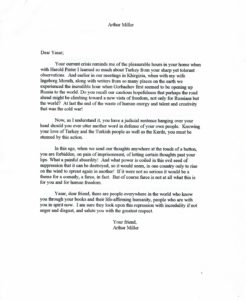
Arthur Miller letter to Yaşar Kemal, March 1997
Bearing a letter from Arthur Miller, who knew Kemal and had himself come to Turkey with Harold Pinter in solidarity a dozen years before, I was among the 141 “foreign publishers” of the booklet Mini Freedom of Expression. This book contained a paragraph from each article published in the larger book. We joined the 1080 Turkish “editors” of the larger volume who included writers, theater actors, politicians, painters, cinema actors and directors, cartoonists, musicians, trade unionists, academics, lawyers, architects and others. The Turkish Penal Code made it a crime to re-publish an article that had been defined as a “crime” so that the publisher as well as the writer was charged.
The “publishers” had presented themselves before the State Security Court and faced charges of “seditious criminal activity.” After questioning the first 99 people, the prosecutor demanded the accused be tried under Article 8 of the Anti-Terror Law and Article 312 on “disseminating separatist propaganda.” After six months only 185 of these individuals had been questioned and brought to trial. If these individuals were given the usual 20-month jail sentence, that would mean ten popular television programs would have to be canceled because their stars or directors would be in prison; five series would have to find new stars and change their story lines. The media would lose over 30 well-known journalists; 15 popular columns would be left blank. Eight professorial chairs would be left vacant, and universities would require new teaching staff. Theater stages and film sets would require many other artists, directors, musicians, etc., and 20 new books about prison life would be added to literature if every author wrote.
Turkey already had over 200 writers either in prison or entangled in legal processes, more than any other country. This protest initiative was unique and creative. The challenge to the court was to bring charges against so many. The State Prosecutor had dropped charges against the foreign participants on the grounds that he wasn’t able to bring us to Istanbul for questioning though the Turkish citizens who had prepared and distributed the booklet could be tried. The organizer of the initiative Şanar Yurdatapan suggested we come to Istanbul and challenge the prosecutor. Though PEN members were willing to come to support their Turkish colleagues, no one wanted to end up in a Turkish prison.
“No one will go to prison,” Şanar assured. The prosecutor had to act within six months, and even in the unlikely event charges were brought, we’d go home before a trial, and there was no extradition from the US, UK and many other countries because no such “offense” existed under their laws. Unlike organizations such as Greenpeace, PEN was not a direct action organization. PEN dealt in words, protest letters, diplomacy, meetings, on occasion candlelight vigils outside embassies and stories in the media. But Şanar, who was a song writer, civic activist, not a PEN member, instinctively understood the dynamics of nonviolent direct action and understood how to get attention and make the point that the Turkish laws were unjust and unfairly administered.
On our first day, which was Women’s Day, we joined the Saturday Mothers’ rally of relatives of the disappeared who gathered every Saturday seeking information on their family members. The gathering had been held every Saturday for a year and a half at Galatasaray Square, ten minutes from our small hotel in Taksim. The crowd of mothers and children held pictures and signs of their loved ones, mostly Kurds, who had been taken away, assumedly by the government and likely killed. On the edges of the crowd police in riot gear gathered but didn’t interfere. Meeting at Galatasaray Square is now banned for Saturday Mothers by the Ministry of Interior since August 25, 2018. They still keep the rally at Human Rights Association branch in one of the back streets.
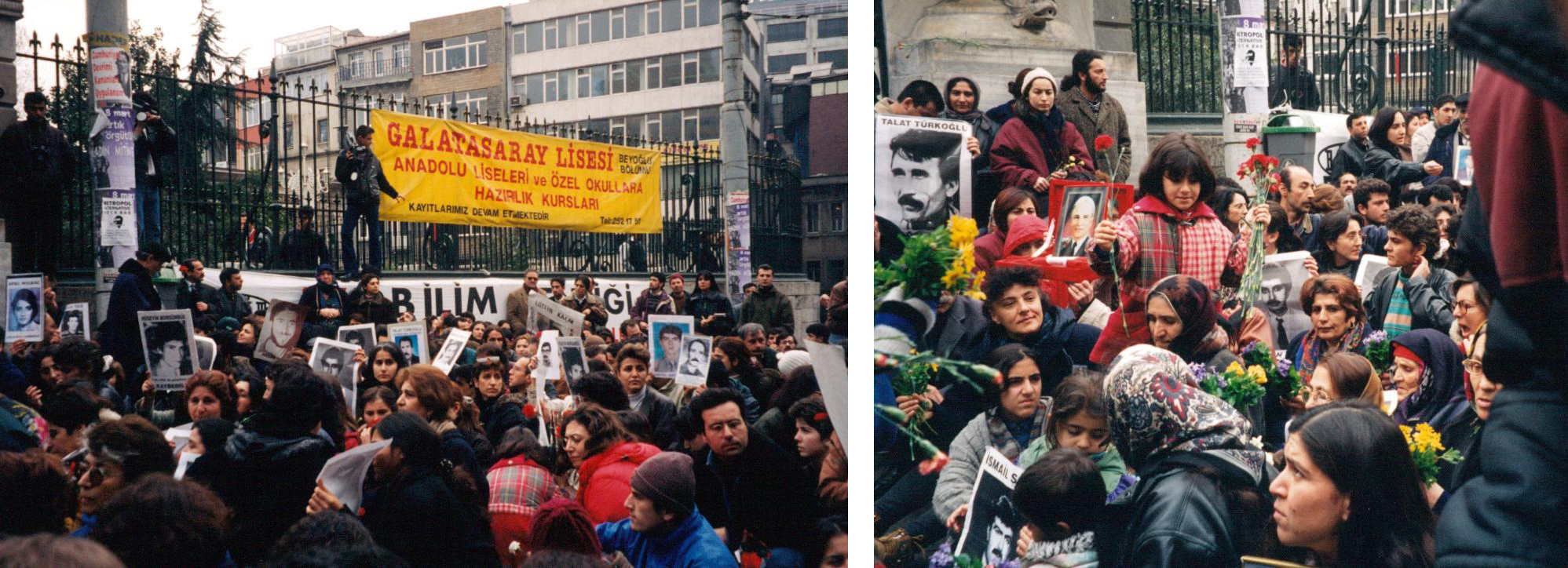
Saturday Mother’s Rally of relatives of the disappeared who gathered every Saturday seeking information on their family members.
From there a number of us went to a women’s rally where hundreds of Kurdish women in traditional dress marched with banners shouting, “We are mothers; we are for peace! Mafia is in Parliament; students are in prison.” Along the route men cheered and dozens of police lined the road frisking and checking bags. This was the last weekend of a 40-day protest all over Turkey. At 9pm every night people around the country turned out their lights or blinked their lights and shouted out their windows and in the street, “Go Away!” in protest over the government. The idea was that people would have one minute of darkness to get years of light. At dinner that Saturday evening we watched as the streets filled with shouting and the lights in restaurant blinked on and off.

Women’s Day march of Kurdish women with police positioned along the route.
The trip to Istanbul was my first of what would turn out to be dozens of visits to Turkey over the years for PEN, for other organizations, and for family. In 1997 the times were tense; soldiers with their weapons and machine guns were stationed at the airport; armed police were on the streets; we were followed; the phones at the hotel were likely tapped. It was difficult to imagine then that it would get much better in the following decade as it did and then much worse in recent years. I’m not sure today we could hold such a gathering with confidence.
Throughout our visit we were covered by the press, including two visits to the State Security Court. In 1997 the legal way to meet publicly was to hold a press conference so we spent our days in press conferences, including one at the Journalists Association. Because I was Chair of the WiPC, I was often the one explaining why we were there. I emphasized that we had come out of respect for Turkish literature and writers. We had not come to break Turkish laws; we did not consider editing a book a crime. We were there to uphold the international covenants that Turkey had signed, approved and became a party to: the Universal Declaration of Human Rights (Article 19), Article 19 of the UN Convention on Civil and Political Rights and Article 90 in the European Convention on Human Rights. We noted that Article 90 in Turkey’s own Constitution declared that no law should supersede these international covenants.
Our PEN delegation included representatives from Canada (Quebec), Finland, Germany, Holland, Israel, Mexico, Palestine, Russia, Sweden, United Kingdom, United States and Turkey. The delegates included James Kelman, Booker Prize winner from Scotland and Turkish writers including Yaşar Kemal, Orhan Pamuk and others.

PEN members from 12 countries join Turkish colleagues for dinner at the first Gathering of the Initiative for Freedom of Expression in Istanbul, March 1997
On Monday we started the day at the State Security Court where Şanar petitioned the prosecutor for an appointment to question one delegate who had to leave early. Because the prosecutor didn’t want to bring charges against “international editors”, an act that would bring international attention, the “Turkish editors” could use this failure as further evidence of the unfair nature and application of the law when they took the case to the World Court. We approached the State Security Court again on Wednesday, when the prosecutor actually locked the gates and wouldn’t see any representative of our group. In the end nine of us—from USA, England, Scotland, Finland, Holland, Sweden, Canada (Quebec), Mexico and Russia—signed a form which said, “I accepted to be one of the collective publishers of this book willingly and I am aware of the legal responsibility. I have nothing else to say.” These forms were then sent registered mail to the prosecutor.
Two small groups visited prisons and the prisoners of conscience, including Dr. İsmail Beşikçi and his publisher Ünsal Öztürk in Bursa and journalist Işık Yurtçu in Adapazarı prison. Louise Gareau-Des Bois from Quebec PEN went to the Adapazari prison and was able to visit with Işık Yurtçu.
Kalevi Haikara from Finland and I went with Şanar on the ferry to the prison in Bursa where we met Ünsal Öztürk’s wife Süreyya. We waited and waited and talked together in the bleak courtyard with grey concrete walls rising around us topped with barbed wire, with guard towers looming over us. We went to the pink concrete building of Bursa Prison with a shield on the door “Ministry of Justice Bursa Special Prison” and waited there too. But we were not allowed to see İsmail Beşikçi, the noted Turkish sociologist and philosopher who wrote about the Kurds history and living conditions. He was one of the few non-Kurdish writers in Turkey speaking out about the treatment of the Kurds. At the time he was also one of the longest serving prisoners. He’d been sentenced to over 100 years though he was released from jail two years after our visit. Of his 36 books, 32 were banned in Turkey.

Kalevi Haikara from Finish PEN and Joanne Leedom-Ackerman, WiPC Chair and member American PEN outside prison in Bursa, along with Süreyya, wife of prisoner Ünsal Öztürk (middle picture) and in conversation at Bursa Prison (far right picture.)
We were also not allowed to see Ünsal Öztürk, Beşikçi’s publisher, who had completed more than a three-year sentence. We met with the press which had gathered. We paid the outstanding fine against Öztürk with funds raised from Turkish writers, artists and many of the visiting PEN members. Öztürk was released the following day though there remained 30 outstanding cases against him, 62 charges waiting to be brought to court, all relating to Beşikçi. Every time he published a book, a charge was brought, but he kept publishing. Öztürk and his wife joined the conference.
The following day we attended the Justice House hearing of the “Kafka Trial.” When one editor of the Freedom of Expression book—actor Mahir Günşiray—faced the judges, he’d read a paragraph from Kafka’s The Trial. The paragraph offended the judges, and they brought a civil suit against him. Sixty-five other writers and artists signed on and said they also endorsed the reading of Kafka and should thus be guilty too. We all piled into the small room where the defendant Mahir Günşiray and his lawyer and the judge met. The hearing was the second or third for him, but with the room full of observers, the judge again postponed the proceedings.
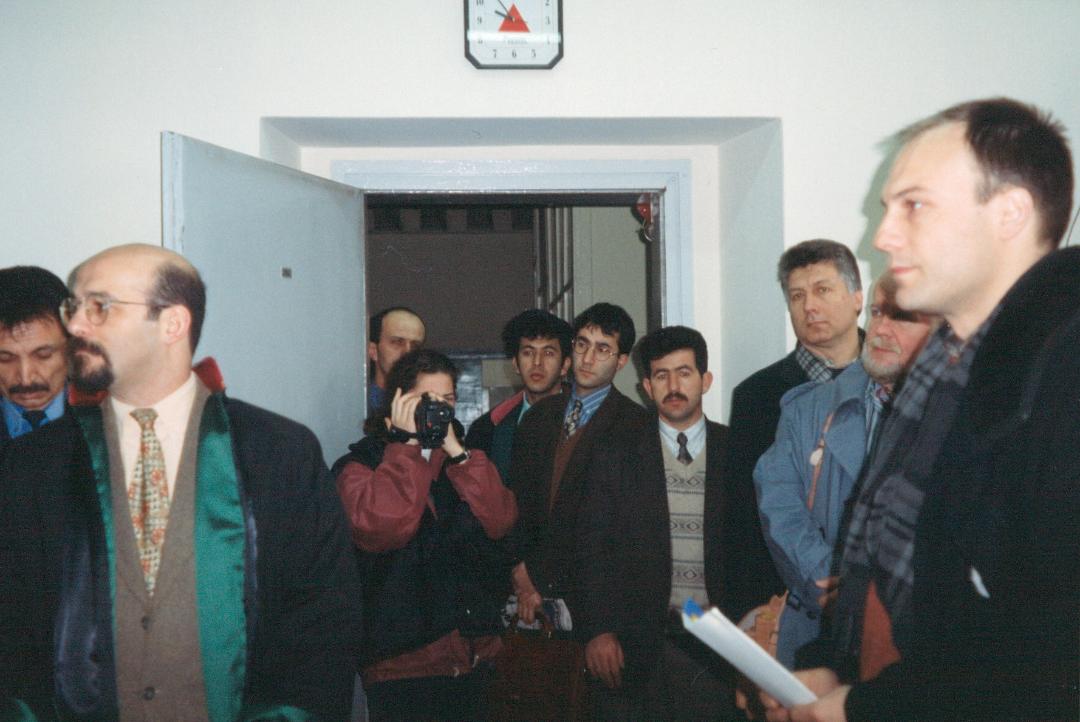
At hearing of “Kafka Trial” in the Justice House
Many of us went next to Istanbul University to participate in a Forum on Freedom of Expression. However when we arrived, hundreds of students were protesting in the plaza, surrounded by riot police with shields. The situation was tense. In Ankara students had recently been arrested after they’d unfurled a banner in Parliament challenging the 300% tuition increase at state universities. The student protesters there were tried with the demand of 18-year prison sentences. The students at Istanbul University asked if we would speak at the rally. None of us were prepared for this potentially explosive scene. The writers who’d come to speak on freedom of expression asked me to talk for the group, all except Sascha from Russian PEN who also wanted to speak. Sascha, Şanar and I addressed the crowd. I emphasized that we were there to uphold the right for free expression, not to take a side with any particular party of government or to take sides on how education was financed in Turkey, but to insist that individuals should have the right to discuss, debate and write about these issues without facing prison terms. We urged that the protest stay nonviolent. We were then ushered out through the police corridor.

Rally at Istanbul University (Includes Soledad Santiago (San Miguel Allende PEN), James Kelman (Scottish PEN), Alexander (Sascha) Tkachenko (Russian PEN), Kalevi Haikara (Finish PEN), Joanne Leedom-Ackerman, (WiPC Chair/American PEN), Hanan Awwad (Palestinian PEN), Turkish writer Vedat Türkali, and Şanar Yurdatapan (with bullhorn).
In the evening the Istanbul Bar Association hosted us. The head of the Bar noted that the Turkish Constitution protects the state against the individual rather than the other way around as in the US. Everyone agreed there was free expression in many quarters of Turkey, but that the danger arose when one addressed Kurdish issues and Kurdish separatism and referred to the PKK.
Attending the meeting was the former PEN main case Eşber Yağmurdereli, a blind poet/dramatist, who’d served 14 years in prison. Released August 1991, he’d spoken in September 1991 at a meeting on behalf of Kurdish prisoners and had new charges brought against him. After five years he was still awaiting the resolution of that case. His passport had been taken from him. He could be sent back to prison for more than 20 years. He said he was unable to write, and if he wrote, he had to hide the writing and not publish. He earned his living now as a lawyer.
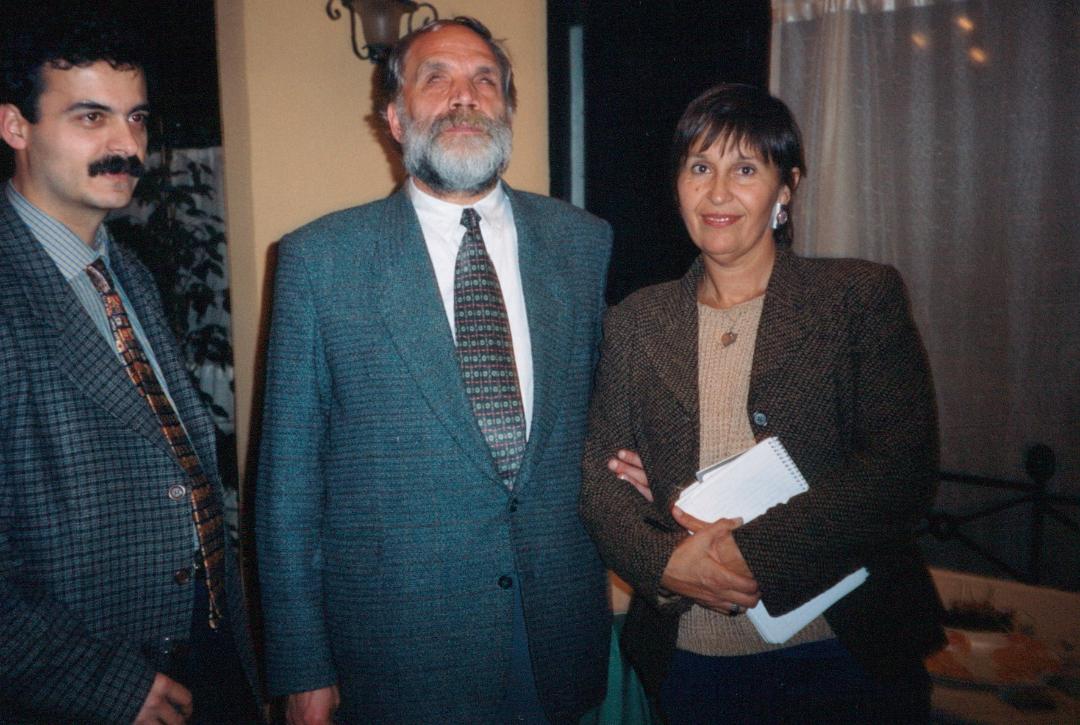
Meeting with Istanbul Bar Association. Eşber Yağmurdereli (middle) and Soledad Santiago (San Miguel Allende PEN) on right.
I also met the young brother of Bülent Balta, an investigation case. Balta, a chemistry honors graduate, a Turk, not a Kurd, had agreed to edit Özgür Gündem, the Kurdish newspaper, because of his sympathies for the difficulty of the Kurds. He had no particular experience as an editor, and after only 11 days was arrested and was serving a four-year prison sentence.
That evening the protest at Istanbul University was all over the news, including pictures of me with a bull horn speaking, but my words had been translated into Turkish so I had no clear idea what it was reported I was saying.
Early the next morning I slipped out of our hotel and walked to a large international hotel nearby where I called home. I asked my husband to confirm my return flight the following day. He asked what the flight was, but I told him to check with the travel agent and confirm. Over the phone I didn’t want to give flight details. I told him what was happening, including the widespread coverage of the protest with my participation, and he told me a colleague in Washington said that the American Embassy knew I was there and warned me not to leave the hotel. I had to leave the hotel, I explained. I was leading the delegation and events were planned, including a farewell dinner on the Bosphorus.
At the final panel/press conference, I noted that I had two sons, and as I observed the young people here, especially the young police officers and the young students, I felt sorrow that these youth were set across battle lines from each other. There was so much talent and promise we had seen. For the first time in the three days of speeches and press conferences, emotion stirred in my voice and I paused for a moment. One of the headlines the following day read something to the effect: “She Cries for Turkey!”

Panel at Initiative for Freedom of Expression Conference, Istanbul March, 1997
The following morning I was to be driven to the airport, but the driver didn’t show up, and I was left to find my own transportation in a taxi. The atmosphere around the conference had slowly made each of us cautious, even slightly paranoid. As I climbed into the taxi, driven by a stranger, I remembered the fortune teller on the ferry a few days before. Proceed with caution…was that her warning? You will make friends…was that the prediction? The road ahead is fortuitous but also fraught? In fact, I no longer remembered what her fortunes were, and I didn’t believe in fortunes or scattered coffee grounds, but I left Istanbul with a strong belief in the people and a commitment to the country and to the writers and publishers and lawyers and journalists and to the young people I had met and to the promise they represented.
In years following I returned to Turkey on numerous missions for PEN and for meetings with Human Rights Watch, with the International Crisis Group, on a trip with UNHCR looking at the Syrian refugee crisis, and several trips with my oldest son who wrestled in the World Championships and European Championships in Ankara and in the World Championships again in Istanbul and also lectured in mathematics at Koc University and other universities and with my youngest son who lived in Istanbul for two years with his two young children and wrote as a journalist on the Turkish/Syrian border and has set two of his four published novels in Turkey.
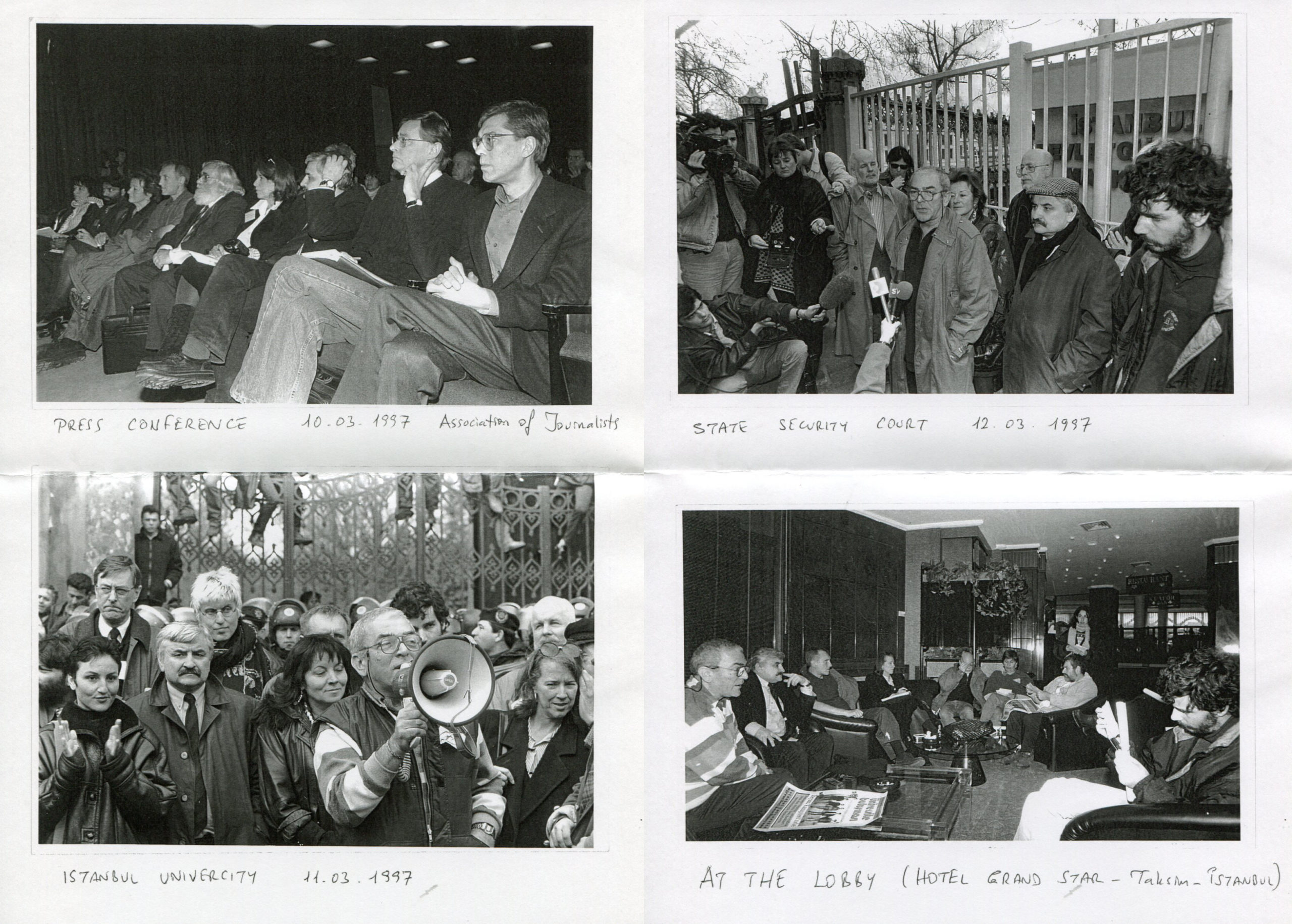
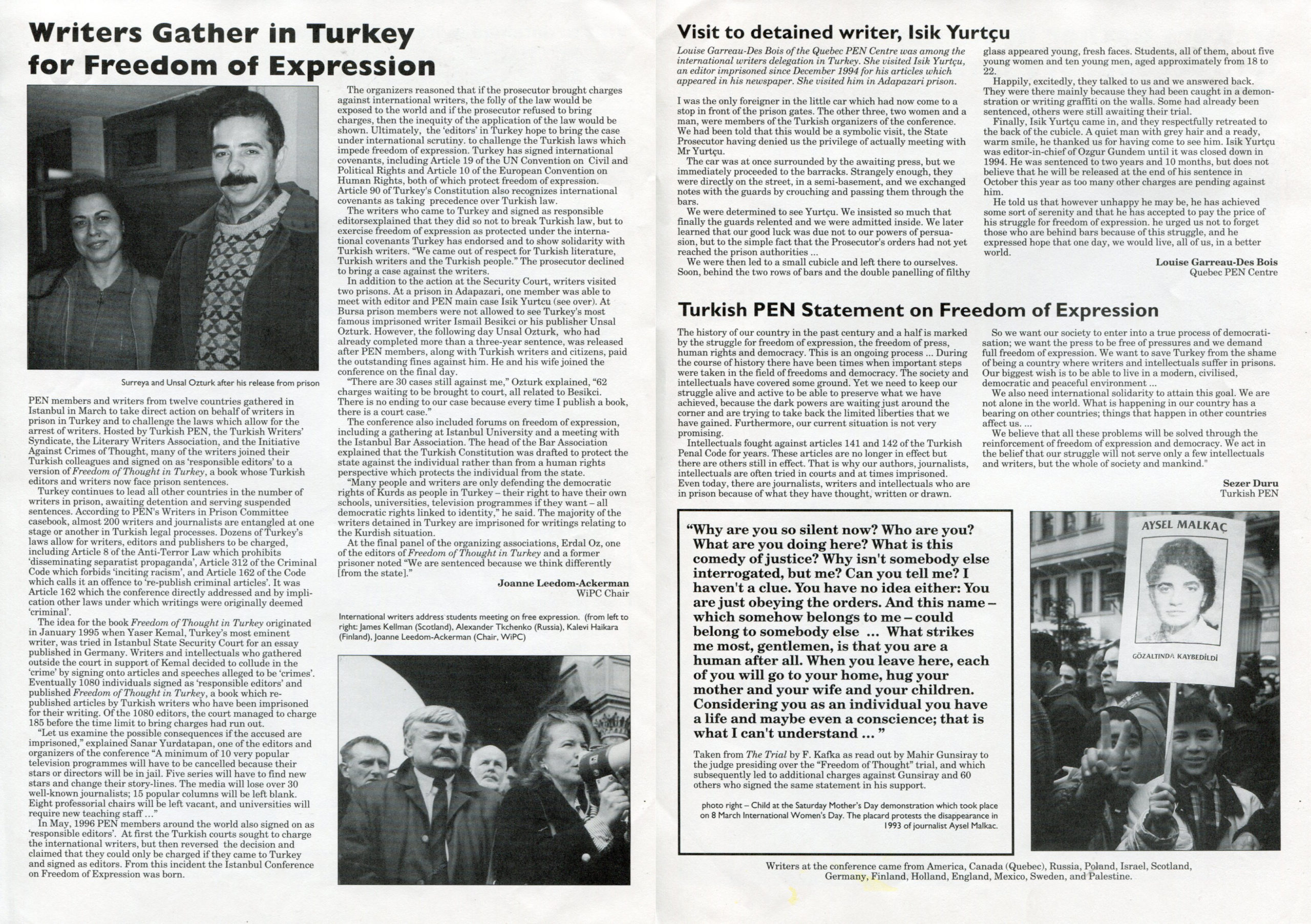
PEN International Writers in Prison Committee Centre to Centre newsletter special Turkey section April 1997
Next Installment: PEN Journey 20: Edinburgh—PEN on the Move, Changes Ahead
PEN Journey 18: Picasso Club and Other Transitions in Guadalajara
PEN International celebrates its Centenary in 2021. I’ve been active in PEN for more than 30 years in various positions and now as an International Vice President Emeritus. With memories stirring and file drawers of documents and correspondence bulging, I am a bit of a walking archive and have been asked by PEN International to write down memories. I hope this personal PEN journey will be of interest.
PEN perches on a three-legged stool. One leg is literature—the work of writers around the world. The other leg is freedom of expression—the defense of writers, particularly those in authoritarian regimes. The third leg is community—the fellowship among writers from over 100 countries sharing, appreciating, translating. PEN began as a loose network of clubs after World War I and grew quickly. The governance of the organization has evolved and at times set the three legs of the stool at odd angles to each other. One such occasion was at the Guadalajara Congress in 1996 as PEN celebrated its 75th anniversary.
My file for that Congress, whose theme was “Literature and Democracy,” bulges with documents and papers and programs in duplicates and triplicates. I don’t know why it is so much larger than the other files. In retrospect, the 1996 Congress was an inflection point, a turn in the road. Maybe I was collecting evidence.

Program from PEN International 63rd Congress in Guadalajara, Mexico
At the Congress I was handing over the reins of the Writers in Prison Committee (WiPC), having finished my term, at least that was my intent. Ronald Harwood was doing the same as President of PEN International, at least that was his intent. Elizabeth Paterson was retiring after 28 years as Administrative Secretary of PEN, and WiPC researcher Mandy Garner was also moving on. PEN was navigating transitions, some planned, but others with a momentum of their own.
For the global context of that time, I reported as Chair of WiPC to the Congress:
“…two political phenomena have emerged, both perhaps linked to the end of the Cold War. First, we have seen conflicts erupting not so much between nations as within nations. This phenomenon, though not new, has offered particular challenges for the writer. Dozens of writers have been killed in conflicts in Algeria, Bosnia, Rwanda, Chechnya. In a number of counties with internal conflicts, including Peru, India, and Turkey, governments have used Anti-Terror Laws to arrest writers who write about the opposing parties.
“Another phenomenon is the increasing number of countries turning to the democratic process for government. The end of the Cold War saw the fall of many totalitarian regimes. Since 1990 over 50 countries have, at least on paper, turned to democracy to select their governments. However, democracy has not always settled so easily into place. One of the indispensable elements of a working democracy is freedom of expression, and this freedom has often been curtailed. Because PEN’s mandate is to protect the free flow of ideas and the freedom of writers to write, to criticize and to protest, PEN’s mission is as compelling today with newly emerging democracies as it was during the Cold War era. In country after country—from Albania, Algeria, Azerbaijan, Cambodia, Cote d’Ivoire, Croatia, Egypt, Ethiopia, Romania, Tajikistan, Zambia—writers can be and have been arrested on such charges as “disseminating false propaganda,” “insulting the President,” and “publishing false news.” The Writers in Prison Committee’s protests and work for these writers is fundamental in a larger political process that is unfolding…
“…Whenever one might feel despair for the way human beings can treat one another, the despair can be lifted by noting the caring of the writers who work for each other. The members of the new Ghana PEN have adopted a writer in Peru; Mexican members and Swedish members work for Turkish writers; Polish, Slovak, Nepalese, French and many other members work on behalf of imprisoned Vietnamese writers. Canadian writers are working on behalf of their Nigerian colleagues, an American writer writes in Portuguese to an Indonesian imprisoned writer; English and German writers have been in long-term correspondence with an imprisoned writer in South Korea. Danish writers are working for an imprisoned writer in Yemen; Norwegian, Finish, Austrian and Czech writers are protesting on behalf of Chinese writers; Australian and Catalan writers work for imprisoned colleagues in Myanmar/Burma…”
These corridors of concern linked men and women around the world in defense of each other and of freedom of expression. The Writers in Prison Committee was a place everyone came together to focus on PEN’s mission. Discussion on resolutions and actions began there and were taken to the full Assembly of Delegates.
That year resolutions passed and action was taken on cases in: Algeria where seven writers had been killed and many more threatened and arrested; the Dominican Republic where intolerance was growing and a writer had disappeared; Turkey where 50 writers were imprisoned and 100 others sentenced to prison; Indonesia where writers had been arrested and imprisoned and the famed writer Pramoedya Ananta Toer was under town-arrest and where in East Timor writers had been killed and leader and poet Alexandre (Xanana Gusmao) was in prison and sentenced to death; Iran where writers were disappeared, tortured and imprisoned; Central Asian Republics, particularly Tajikistan, where at least 29 journalists had been murdered in the last four years; China where dozens of writers were serving long prison sentences or were sentenced to re-education camps; Cuba where journalists were imprisoned and harassed; Mexico where journalists were killed, disappeared and threatened; Vietnam where writers were serving lengthy prison terms; and Nigeria where Ken Saro Wiwa had been hanged the year before and other writers were in prison.

Writers in Prison Committee at Guadalajara Congress, 1996. L to R: Alexander Tkachenko (Russian PEN), Joanne Leedom-Ackerman (WiPC Chair), Mandy Garner (WiPC researcher)
At the WiPC meeting there was a report on PEN’s quiet mission to Cuba where writers were hoping the system would open up after the global changes in 1989. Writers there said they were in a goldfish bowl but never sure how big the bowl was from day to day, and those arrested often faced a choice between long prison sentences and exile. The WiPC meeting also heard from the sister of Myrna Mack, a Guatemalan anthropologist who had been killed and was one of the significant leaders of the worldwide movement against impunity. We also launched the anthology This Prison Where I Live of writings from PEN cases over the years.
In addition to the Writers in Prison Committee, the Translation and Linguistic Rights Committee, the Peace Committee and the Women’s Committee met in the early days of the Guadalajara Congress. Literary sessions focused on the Congress theme with programs on Literature of Old and New Democracies and Post-Communist Democracies.
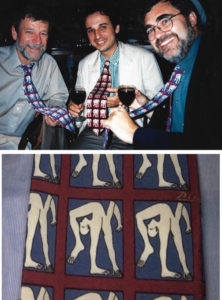
Picasso Club neckties: Top l to r: Michael Scammel (International PEN Vice President), Carles Torner (Catalan PEN), Isidor Consul (Chair PEN Translation and Linguistic Rights Committee)
Also during those first days of the Congress, a group of members were meeting off site to launch a process to reshape the governance of PEN. For as long as anyone could remember, the International Secretary and President had been the sole decision-makers between Congresses where the Assembly of Delegates voted on issues. Many felt this system no longer allowed sufficient democratic expression for a worldwide organization.
I was friends with many of those meeting, but the WiPC staff and I kept out of the off-site gatherings. We felt we needed to keep the WiPC a neutral place where everyone came together. One morning the men in that group entered the Assembly of Delegates all wearing the same Picasso print necktie, “a figure twisted like a pretzel,” one member described later, ties bought at the Picasso restaurant where they had met. The group had felt shut out of discussions, and now were coming forward together. It was like a declaration of revolution. “For heaven sakes, take off the ties!” I recall someone saying, and the ties gradually were folded into pockets, but a revolution had begun.
Two Spontaneous Resolutions were introduced to the Assembly:
Spontaneous Resolution 1 On PEN’s Structure Submitted by the Swedish Centre, seconded by the Canadian Centre, and supported by the American, Bangladeshi, Catalan, Danish, Finnish, Japanese, Kenyan, Melbourne, Nepalese, Norwegian, San Miguel de Allende, Slovakian, Swiss German and USA West Centers.
Resolutions II on P.E.N’s Structure, submitted by the same centres.
“Taking into consideration the debate on P.E.N.’s composition, development and structure, held in Guadalajara on Sunday, November 10th, 1996, on the occasion of P.E.N.’s 75th anniversary;
Convinced of the need to enhance its democratic structure and facilitate wider international participation;
Resolves to request one P.E.N. Centre to elaborate the draft of a revised version of the current regulations, in cooperation and consultation with all the other Centres, as well as the International President and Secretary….”
After discussion and debate, it was agreed that PEN centers should send their suggestions for reform of the Constitution to the Japanese Centre, and Japanese PEN would coordinate and forward them to the International Headquarters and to all Centres so that the Centres could consider and vote on them at the 1997 Edinburgh Congress. One of these proposals, which was presented in Guadalajara by the Spanish-speaking Centres, was that Spanish should be made the third official language of PEN if financing could be raised.

Delegates at Writers in Prison Committee meeting PEN 63rd Congress in Guadalajara, 1996
PEN had its own democratic elections on the Congress agenda with a vote for the new International President. There was only one candidate put forward by the International Secretary and his PEN Center, a respected poet from Romania, a woman, who would have been the first woman President of PEN. She herself had lived under a repressive regime, but she had not been very involved in the international organization, and she had not been part of the discussion to reform PEN’s governance. When she spoke to the issue, questioning the need and the process, there was in the lunch conversations and in the corridors afterwards, pushback and a questioning of her suitability as President.
The next morning she withdrew her candidature. She said that it had become clear that the organization was undergoing a transformation and she felt she was the wrong person to be president at such a time of change. It seemed to her that PEN was in process of being transformed from an organization of writers into something less. She had been motivated by her dream of PEN, not as an organization with bureaucratic structures and competing pressure groups, but as a place where the writers of the world came together. She was a writer from Eastern Europe who had had great problems under successive dictatorships. From this perspective she had had an image of PEN as something extraordinary. It was true that she had confused PEN with the Writers in Prison Committee, she said. It was PEN which had spoken out when she was forbidden to publish. The work of the Writers in Prison Committee remained very important to her. What troubled her was the discovery of pressure groups who appeared to be fighting for a power which in her eyes had no existence. The only power which writers possessed was the power of their books and the fear of those in power that the truth told in those books would outlive their tyrannies.
Many members applauded her withdrawal speech. It articulated the pressure and tension in the 75-year-old organization which lived on ideals but also had to increasingly function in the competitive world of nongovernmental organizations with budgets and boards and democratic processes, an organization that needed to calibrate, modernize and keep all its members engaged.
Ronald Harwood agreed to serve another year as President. The International Secretary was reelected. Some members noted quietly that regulations required he face election every year now because of his age.
My replacement as Chair of the Writers in Prison Committee was unanimously elected. The former President of Danish PEN, Niels Barfoed was a respected writer and longtime PEN member, who as a young boy had circumvented the Nazis as a courier with banned literature from his older brother who was in the Resistance. The WiPC had chosen a nominating committee to assure qualified candidate(s) were nominated. I left Guadalajara satisfied that the new WiPC process had come up with such a well-qualified Chair. I commiserated with Ronnie, thanking him for taking on another term though it meant his own writing would be curtailed. I was elected as a Vice President of PEN International and left Guadalajara happy to be returning to my own work. However, a few months later Niels fell ill and resigned, and I too was back as Chair of the Writers in Prison Committee. Ronnie and I served a fourth year together.
At the end of the Congress, I went to the airport with Alexandre Blokh, the longtime International Secretary. It had been a difficult Congress for him. He questioned whether he had stayed on too long. At the Edinburgh Congress in 1997 new governance and regulations were proposed, and at the 1998 Congress in Helsinki Alex stepped down after 16 years. PEN International was on its way to having an international board and more democratic governance which presented its own challenges as the organization proceeded towards the 21st Century.
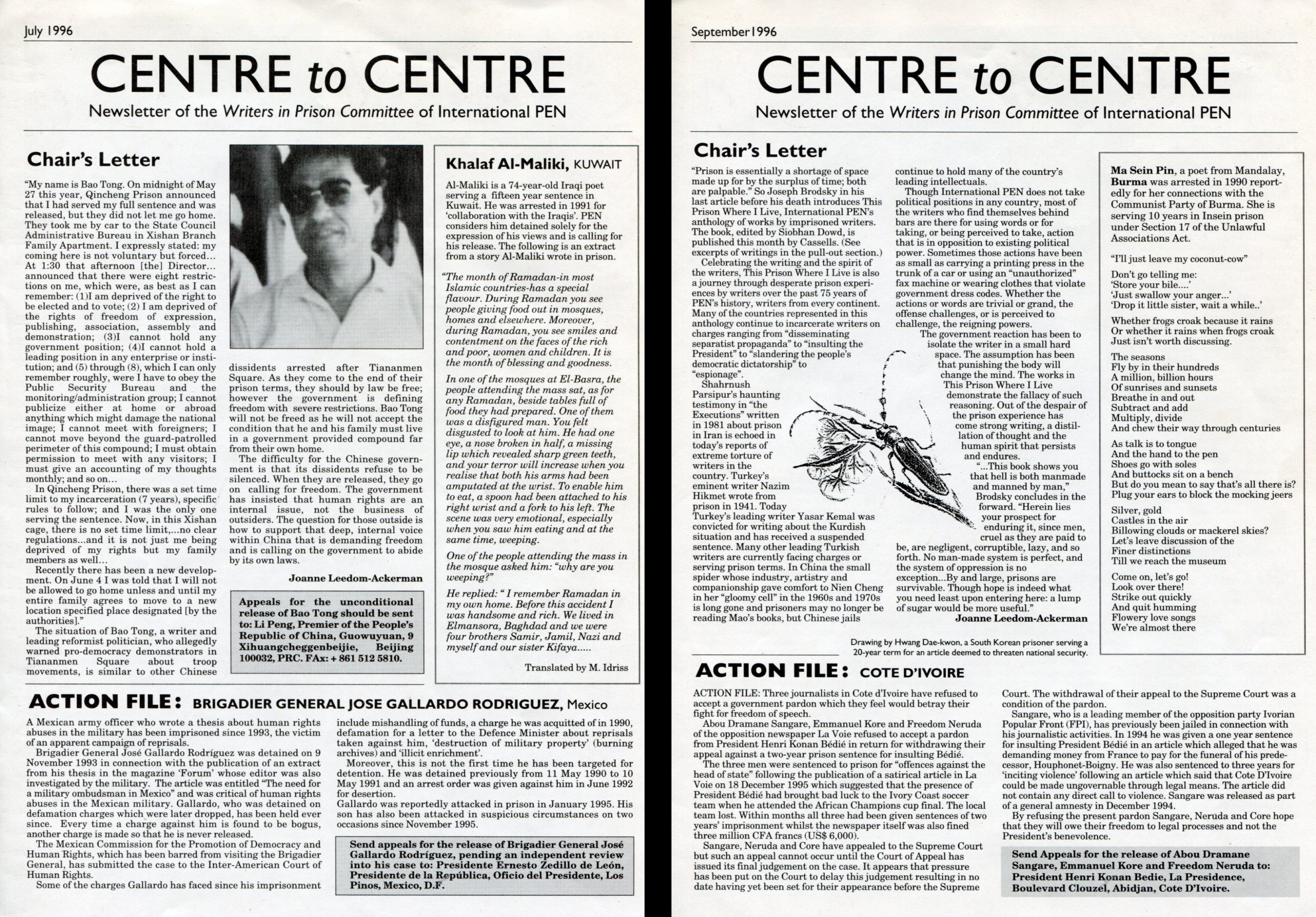
PEN International Writers in Prison Committee bimonthly newsletter, July and September, 1996
Next Installment: PEN Journey 19: Prison, Police and Courts in Turkey—Freedom of Expression Initiative
PEN Journey 16: The Universal, the Relative and the Changing PEN
PEN International celebrates its Centenary in 2021. I’ve been active in PEN for more than 30 years in various positions and now as an International Vice President Emeritus. With memories stirring and file drawers of documents and correspondence bulging, I am a bit of a walking archive and have been asked by PEN International to write down memories. I hope this personal PEN journey will be of interest.
Fremantle, Australia is far away, at least if you live in the Americas or Europe or West Africa. So is Tokyo, Manila, Nepal, Hong Kong,—all destinations of PEN Congresses and conferences. As a global organization with centers in over 100 countries, PEN tries to cover the world with its meetings and at least once or twice a decade organize a Congress in Asia or Australia with its centers there.
 In 1995 for PEN International’s 62nd Congress Perth PEN hosted delegates from around the world in Fremantle, a port city on Australia’s western coast in the Perth metropolitan area, a picturesque city with Victorian architecture and, as I recall at the time, a town out of the 1960’s where time hadn’t quite caught up. The city’s reputation was partially derived from its history as a penal colony from the 1850’s to 1991. The traditional Aboriginal people who lived there called the area Walyalup “the crying place.”
In 1995 for PEN International’s 62nd Congress Perth PEN hosted delegates from around the world in Fremantle, a port city on Australia’s western coast in the Perth metropolitan area, a picturesque city with Victorian architecture and, as I recall at the time, a town out of the 1960’s where time hadn’t quite caught up. The city’s reputation was partially derived from its history as a penal colony from the 1850’s to 1991. The traditional Aboriginal people who lived there called the area Walyalup “the crying place.”
The 65th Congress was one of the smaller for PEN, less formal with many delegates staying in the homes of local writers rather than in a hotel. Instead of formal receptions in houses of state, at least one evening’s entertainment was a game of literary trivia and bingo. Because the venue was on the harbor, the swimmers among the delegates, particularly Sascha (Alexander Tkachenko) General Secretary of Russian PEN, tried to swim each day despite the warnings that waters were shark-infested. Sascha defied the sharks which he considered a milder threat than what he was dealing with back home in Russia.
The Congress theme Freedom of Expression and Cultural Context translated into an endorsement of the universality of human rights as expressed in the Universal Declaration of Human Rights. Held in the 50th anniversary year of the United Nations’ founding, PEN insisted human rights were not a relative notion. “While the concept of a universal right may not have penetrated the mechanisms of all states, the invocation of the universal right to free expression remains one of the essential tools that PEN and other organizations use to apply pressure and insert a wedge into the conscience of nations,” the Writers in Prison Chair’s report noted that year.
While certain human rights were absolute, governance was relative, and PEN itself was beginning to struggle with its structure. The relaxed atmosphere of Fremantle allowed informal discussions among delegates who were urging a more democratic structure for PEN. As PEN International headed towards its 75th anniversary the following year, Boris Novak, Slovene PEN President and Chair of the Peace Committee noted that the inner structure of PEN was no longer adequate for the needs of such a large global organization. This sentiment was echoed by the American PEN delegate and delegates from Scandinavian centers. The International Secretary agreed to hold a special meeting in Perth on this question, and the discussion and the dissent began.
As chair of the Writers in Prison Committee, I shared the concerns, but the WiPC staff and I determined that the Writers in Prison Committee should remain a place where everyone came together and focused on the mission of getting writers out of prison and securing freedom of expression so we stayed on the edge of the debate. The internal politics of PEN were stirring and erupted a year later at the 1996 Congress in Guadalajara. In Perth, however, the breezes were balmy and the water warm enough to dip in if not to cross the distance between the old and the new. That process would evolve over the next several years and Congresses to come.

Brief summary of work follows in this excerpt from my 1995 Writers in Prison Committee Chair report:
“Since [he] was arrested, my relatives and close friends have not dared to speak to me or telephone me for fear of being arrested. They have steered clear of me. I can count on the fingers of one hand the number of friends and relatives who have stood by me. Since our problems began, I have had to rely on my family and our friends from abroad…I am very grateful to them…In short, your support will not only help my family, but also the families of others who are in distress. We will never forget your help.”
—Letter to PEN WiPC from the wife of an imprisoned writer who for reasons of security must remain anonymous.
“The work of the Writers in Prison Committee this year has included appeals on writers’ behalf to 59 countries, around 150 appeals from the London office and hundreds more from centers around the world who responded to PEN’s Rapid Action calls and to the specific cases of the prisoners they have adopted…
“The fiftieth anniversary of the end of World War II saw celebrations in Europe but also saw a resurgence in racist and hate literature and speech. Anti-fascists writers found themselves threatened, especially in Austria where one writer was almost murdered. Turkey continued to be the most difficult country in the region with over 200 arrests, brief detentions, killings and disappearances, almost all relating to writings on the Kurdish situation…
“The other issues to watch—the rise of militant fundamentalism, terrorism, separatist movements—but these are generally issues over which PEN has little control even though they affect the fates of individual writers…
“Progress this year can best be measured in the releases of prisoners and also by the changes in certain countries’ laws. The Writers in Prison Committee lobbied governments and international bodies on general issues such as the death penalty, long term imprisonment and anti-terror laws and has seen some effect. PEN, along with other human rights organizations, urged the Indian government to reform or abandon its anti-terrorist law under which writers were detained, and recently the government has voted not to renew the law. The WiPC has also spent a large effort speaking with representatives of the Turkish government at embassies and at the United Nations to urge the amendment or abolishment of Article 8 of the Anti-Terror Law. Just last week the Goverment finally announced its plan to amend the law. We are hopeful this will soon take place in such a way that hundreds of writers detained because of Article 8 will no longer face prison terms, though we are cautious in our optimism.
“The main substance of the Writers in Prison Committee work, however, is not shown in the statistics nor through the reformed government policy, but can best be measured in the lives of individual writers. This year over 90 writers have been released from prison and some individuals facing severe penalties, including death, have instead received clemency. Unfortunately in many countries as one writer walks out of prison, another is being brought in…
“Turkish writer Esber Yagmurdereli, who is blind, recently had his 20-month prison sentence ratified. He was arrested for a speech about the Kurdish situation at a human rights meeting just weeks after his release from 13 years in prison. [I’d like to end with] an excerpt from one of his plays, “Crossing Boundaries” which deals with the experience of a political prisoner:
The moment lost all sense of time and the door opened
You were leaving…the anguish would lift from your heart
…Your unconquered eyes would be mine from now on.
…You went and waking to your absence was to be condemned to a harsh fate
And I felt the damnation again when I heard my forehead crack against these silent walls
…Suddenly I was without a country like so many Palestinians
I even forgot my language: I forgot I was a scream in the river of your voice
(Didn’t we force these walls to memorize our voices
Didn’t we breastfeed these rotten cells our best folk songs?)
We set alight wet stones as we rested our backs against them…
…I kept biting my lips, but never forgot the memory…
And as the moon fell into the night, I saw your smile in its eternal beauty
The rainbow shone on your forehead and its greeting was a declaration
…then that moment lost all sense of time and the door opened
The silenced suddenly arose and spirits soared like rain-birds.”
Next Installment: PEN Journey 17: Gathering in Helsingør
PEN Journey 13: PEN and the U.N. in a Changing World
PEN International celebrates its Centenary in 2021. I’ve been active in PEN for more than 30 years in various positions and now as an International Vice President Emeritus. With memories stirring and file drawers of documents and correspondence bulging, I am a bit of a walking archive and have been asked by PEN International to write down memories. I hope this personal PEN journey might be of interest.
We sat on one side of the dining table at the embassy in Geneva drinking orange Fanta—Sara Whyatt, Coordinator of PEN International’s Writers in Prison Committee (WiPC), Fawzia Assaad, member of Suisse Romand PEN and liaison for PEN at the UN Human Rights Commission, and myself, Chair of PEN International’s WiPC. On the other side of the table visibly sweating sat three diplomats from North Korea.
The week before, U.S. Secretary of State Warren Christopher had visited the same embassy. The United Nations Human Rights Commission was meeting in Geneva, and PEN, which had consultative status at the U.N., had sent us as representatives to the Commission meetings with targeted cases and country reports, including one on North Korea. The year 1994 was a time of potential thawing in relations with North Korea, and the diplomats on the other side of the table were telling us how they would like to have a PEN Center in North Korea.
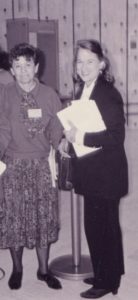
(l to r) Fawzia and Joanne at UN Human Rights Commission
Fawzia, who was ready to reach out to people, agreed that could be a possible step, but Sara and I gently nudged her under the table and explained that there were certain important criteria in a country for a PEN center to exist. The criteria included some measure of freedom of expression and an acknowledgement of this value though admittedly the extent of freedom varied in countries with PEN Centers. We asked if writers and their families who have been separated since the war might meet on neutral ground. The Counsellor answered, “Why not?” We asked if North Korea would open itself to visits by writers from abroad to discuss freedom of expression. The Counsellor again answered, “Why not?” We agreed that a first step could include an exchange of writers.
As the dinner and conversation proceeded, we all noticed the visible discomfort and sweat on the brows of the diplomats. We later speculated who might have been listening, perhaps on a device or behind the curtain on the other side of the table. Finally the young daughter of the senior diplomat was introduced to the room and entertained us on a traditional Korean musical instrument which she played as she sang Swiss folksongs.
The meeting was one of the more surreal in my tenure as Chair of PEN’s Writers in Prison Committee. None of our requests came to pass, and it wasn’t until almost two decades later in 2012 that PEN finally welcomed a North Korean PEN Center In Exile, whose members had managed to get out of North Korea with harrowing stories of escape. [Ref. JLA blog Sept. 2012]
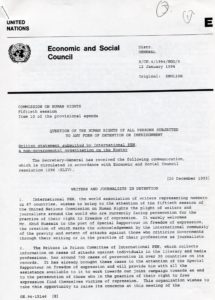
Page 1 PEN International’s submission on Detention and Imprisonment of Writers and Journalists to the UN Human Rights Commission
For the past 70 years, PEN International has maintained consultative status at the United Nations. This status has meant that PEN International’s reports and activities are both supported through UNESCO funding and are received and considered in UN forums, particularly at the UN Human Right Commission and in UNESCO.
After World War II UNESCO, whose mission was “building peace in the minds of men and women” through education, science and culture, looked to start organizations in these sectors. For theater and the arts it created the International Theatre Institute which creates platforms for the international exchange and engagement in the performing arts. However, when it came to creating an organization for literature, UNESCO recognized that PEN already existed, and so it has worked with and supported PEN congresses, conferences and programs around the world. These programs have also included the work of PEN’s Translation and Linguistic Rights Committee (TLRC) which developed the Universal Declaration of Linguistic Rights, also known as the Barcelona Declaration, passed by PEN in 1996 when the current Executive Director of PEN International Carles Torner chaired the TLRC.
Though PEN continues its relationship with the U.N., UNESCO’s budget has declined over the years as has its financial support and PEN’s dependency. PEN officials, including myself, have still visited UNESCO headquarters in Paris and UNESCO representatives still attend PEN conferences and congresses. But the change in both funding and governance for PEN International can be traced back to the years of the fin de siècle when governance around the world was challenged to include wider democratic vistas.
At PEN’s subsequent congress in Perth, Australia in 1995, conversations began regarding a change in governance for PEN, and by PEN’s 75th Anniversary in 1996 at the congress in Guadalajara, Mexico, the momentum for change became inexorable.
But first, meetings in Bled, Slovenia with the Peace Committee and further campaigns on writers threatened around the world.
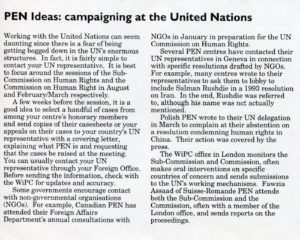
PEN Writers in Prison Committee Centre to Centre newsletter, Aug/Sept. 1994
Next Installment: PEN Journey 14: Speaking Out: PEN’s Peace Committee and Exile Network
View on the Bosphorus: Rights in Retreat
I’m sitting on the Bosphorus today in Istanbul looking across to the Asian side over the balustrade of a European porch. I’ve been visiting Istanbul over the last 20 years for conferences, recently for visits to refugee camps and most often now to see family living here. Istanbul is one of my favorite cities, full of heart, multiple cultures, history and citizens of intellect and warmth.
But recently the atmosphere has chilled. I’ve come on this trip to participate in the launch of Human Rights Watch’s 2016 World Report which focuses on the “Politics of Fear and the Crushing of Civil Society” as causes that imperil citizens’ rights around the world. Istanbul was chosen as the launch city because it sits at the nexus of east and west, is the crossing point for millions of refugees fleeing the Syrian war and has an active civil society and free press that are now severely tested as the environment for rights deteriorates.
“Government-led restrictions on media freedom and freedom of expression in Turkey in 2015 went hand-in-hand with efforts to discredit the political opposition and prevent scrutiny of government policies in the run-up to the two general elections,” according to Human Rights Watch (HRW) 2016 World Report.
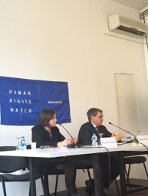
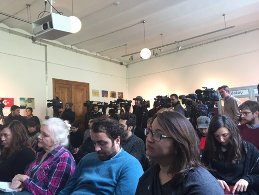
The restrictions include the investigation of Cumhuriyet newspaper for posting a report showing weapons on trucks allegedly headed to Syria. The paper’s editor Can Dϋndar and Ankara representative Erdem Gϋl were arrested and are now in jail awaiting trial. Other journalists have been arrested for criticizing the government. There have been police raids on media groups, a widespread firing of journalists perceived to be in opposition to the government, in particular to President Recep Tayyip Erdoğan. Publisher Cevheri Gϋven of Nokta news magazine and editor Murat Çapan spent two months in jail for “inciting an armed insurrection against the government” for a report and a satirical picture of Erdoğan. Nokta’s website remains blocked by a court order. Months of pretrial detention have been handed out to those allegedly insulting Erdoğan via social media and during demonstrations.
I first came to Istanbul in spring, 1997 for the “Initiative for Freedom of Expression”, a conference that brought together PEN International and freedom of expression organizations in Europe to protest the harsh treatment of writers by the Turkish government and courts. Charges had been brought against the celebrated Turkish novelist Yaşar Kemal for an article he wrote for the German magazine Der Spiegel in which he accused the Turkish army of destroying Kurdish villages. Though he was acquitted, he is quoted as saying, “One person’s acquittal does not mean freedom of expression has arrived. You can’t have spring with only one flower. We still have to work very hard to achieve democracy in Turkey. I will continue to write these things until there are no trials against expression.” Kemal passed away last spring at age 91.
At the time activist and song writer Şanar Yurdatapan organized a publication that included Kemal’s essay and the writings of other Turkish and Kurdish writers who had been banned or imprisoned. He mobilized Turkish artists and publishers and academics to sign on as the publisher, and he asked writers from the more than 100 centers of PEN International around the world also to sign on as publisher. The publication thus challenged the government which would have to bring charges against hundreds of people as publisher. And so the Gathering for Freedom of Expression was born.
I chaired PEN International’s Writers in Prison Committee during that time, and along with dozens of writers from around the world, I arrived in Istanbul for the conference. Şanar and his colleagues organized visits to prisons to try to see the many writers and publishers incarcerated, visits to courthouses to observe hearings and trials, a visit to the prosecutor’s office to insist that we too should be charged as publisher. We understood the embarrassment such would cause the government, though none of us aspired to go to a Turkish prison. The Initiative for Freedom of Expression held multiple press conferences because the only legal way to gather at that time was to have a press conference. Yaşar Kemal spoke at one of these.
There was also a freedom of expression conference called at a university where hundreds of students had mobilized in the campus square when we arrived. Many were protesting tuition hikes, not writers in prison, but the two gatherings merged. Riot police surrounded us all as we addressed the crowds.
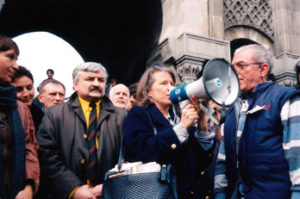
The period of 1997 in Turkey was charged. The heavy hand of the State was palpable. The police were at every gathering. Cars followed us. In 1997 PEN International recorded more writers in prison or tangled in the judicial processes in Turkey than almost anywhere in the world except perhaps China.
But citizens were mobilizing and claiming space for expression. In the subsequent years the Initiative for Freedom of Expression and other freedom of expression and human rights organizations recorded regularly the abuses and circulated these and mobilized actions. Şanar was sent to prison because of his work and there studied the history and principles of civilian based resistance, practices he had instinctively employed. Every other year the Gathering for Freedom of Expression assembled in Istanbul, several of which I attended. Turkey could mark its progress by the decrease of the numbers of writers and publishers in prison. Until last year.
At the launch of HRW’s World Report this week, Şanar and I met again, smiling to see each other but not smiling about the state of affairs. Turkey appears to be reverting back to the ways and days of the 1990’s. Şanar has returned to song writing, still passionate, but addressing issues through music and advising (not quite on the sidelines) the next generation of activists.
Living In and Beyond History
The white horse-drawn carriages clomp on the gray stones of Old Town Krakow, circling this largest of medieval town squares in Europe. On the fringe sit restaurants with white and yellow umbrellas advertising Polish beers where residents and tourists dine on red-checked table cloths. In the center the Town Hall Tower dominates, and around the periphery old terraced houses and shops form an arcade where one can buy everything from pastries to books to clothes to shoes.
Today tourists can look out over the city from the observation deck at the top of the gothic Town Hall Tower, originally built of stone and brick at the end of the 13th century. The tower used to house the city prison with a medieval torture chamber in its cellars. Thirty miles to the west lay some of the worst torture chambers of the 20th century: the prison camps of Auschwitz and Birkenau, where an estimated three million people died during World War II.
This historic city of Krakow was the scene last week of “Writing Freedom”—the biennial gathering of PEN International’s Writers in Prison Committees from around the world in joint symposiums with ICORN (the International Cities of Refuge Network) and the third Czeslaw Milosz Literary Festival.
Along the Vistula River writers gathered from every continent and from regions where they are now, or were in the past, under threat, including Iran, Iraq, Syria, Yemen, Bahrain, Egypt, Morocco, Algeria, Ethiopia, Eritrea, Zimbabwe, China, Myanmar/Burma, Pakistan, Philippines, Turkey, Russia/Chechnya, Belarus, Mexico, El Salvador, as well as from all over Europe and North America. The more than 200 guests strategized over the challenges to freedom of writing and expression. They explored new threats such as digital surveillance, new adversaries in non state actors and new and old methods of protest and advocacy; they also heard reports of those currently on the frontlines.
While global solutions to these large questions are not easily forthcoming, answers are often found in specific acts of one writer advocating on behalf of another, of one city opening its doors to one writer at a time, of a community gathering and raising a collective voice and finding where to target that voice.
PEN, with over 100 centers worldwide, works for the release and protection of writers imprisoned, threatened and attacked for their work, and ICORN places writers at risk in cities where they can live and work for a year or two without threat.
One of Krakow’s most well-known writers and exiles was Joseph Conrad, who as a child in his school years, lived on Poselska Street here before he emigrated to England. Years later when he was a famous writer, he returned and stood at night in the “vastly empty Main Square,” where he noted, “the streets were in precisely the same condition as when I had seen them upon departure forty years previous.” But the following day World War I erupted and Conrad, a citizen of an enemy country now, again had to flee.
History moves on and regions mend as has Krakow from its brutal history under the Nazis and then under Soviet domination, but unfortunately oppression continues, as evidenced in the stories of the writers who had escaped and now lived as exiles–the Iranian writer learning Swedish or the Zimbabwean writer learning Norwegian in their new homes.